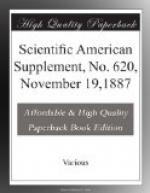The average mortality for England and Wales was 22.4 in 1838, and in 1886 19.3, which shows a saving on last year’s population of England and Wales of 86,400 lives annually, and a saving in suffering from an estimated number of about 1,728,000 cases of sickness. To accomplish all this, vast sums of money have been expended, probably not always wisely, inasmuch as there have been mistakes made in this direction, as in all new developments of science when applied in practice, and evils have arisen which, if foreseen at all at the outset, were underrated.
The great object of the public health act, 1848, was to enable local authorities by its adoption to properly sewer, drain, and cleanse their towns, and to provide efficient supplies of water, free from contamination and impurities dangerous to health. The raising of money by loans repayable in a series of years, which the act empowered, enabled all these objects to be accomplished, and, while the first duty of local authorities was undoubtedly the provision of a good supply of water and proper sewerage for the removal of liquid filth from the immediate vicinity of inhabited dwellings, the carrying out of proper works for the latter object has been of much slower growth than the former. Private companies led the way, in fact, in providing supplies of water, inasmuch as there was a prospect of the works becoming remunerative to shareholders investing their money in them; and in nearly every instance where local authorities have eventually found it to be in the interests of the inhabitants of their districts to purchase the work, they have had to pay high prices for the undertaking. This has generally led to a great deal of dissatisfaction with companies holding such works, but it must not be forgotten that the companies would, in most instances, never have had any existence if the local authorities had taken the initiative, and that but for the companies this great boon of a pure supply of water would most probably have been long delayed to many large as well as small communities.
The evils which have arisen from the sewering and draining of towns have been of a twofold character. First, in the increased pollution of rivers and streams into which the sewage, in the earlier stages of these works, was poured without any previous treatment; and secondly, in the production of sewer gas, which up to the present moment seems so difficult to deal with. These concomitant evils and difficulties attending the execution of sanitary works are in no way to be underrated, but it still remains the first duty of town authorities to remove, as quickly as possible, all liquid and other refuse from the midst and immediate vicinity of large populations, before putrefaction has had time to take place.




